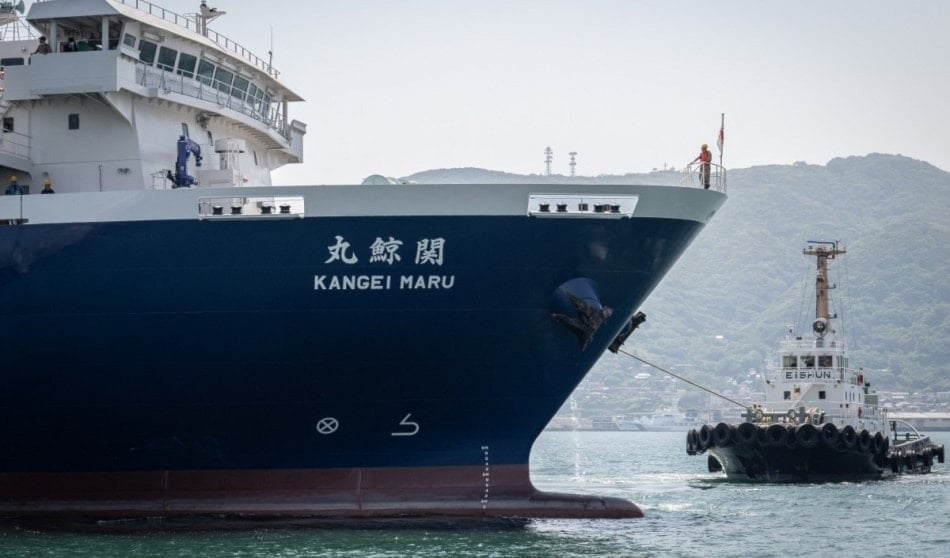Australia expresses disappointment in Japan's whaling target expansion
Japan has added fin whales to its list of whaling targets, joining Bryde’s, minke, and sei whales.
-

Japan's new whaling mothership, the Kangei Maru, leaves port following the ship's launch ceremony in Shimonoseki City, Yamaguchi prefecture on May 21, 2024. (AFP)
The Australian government is "deeply disappointed with Japan's decision to expand its commercial whaling target list to include the second-largest whale species at risk of extinction."
Australia's Environment Minister Tanya Plibersek denounced Japan's decision to add 59 fin whales to its whaling program, an agreement passed by the government on Wednesday, enabling its commercial hunt in the country's confined economic zone.
“Australia is opposed to all commercial whaling and urges all countries to end this practice," Plibersek said, asserting that “Australia’s efforts through the International Whaling Commission have contributed to a whaling-free Southern Ocean and a decline in commercial whaling around the world. Australia will continue to advocate for the protection and conservation of whales and the health of our ocean for future generations.”
Whale activist and chief executive of the Australian Marine Conservation Society, Darren Kindleysides, joined Plibersek in opposing Japan's commercial hunting, describing it as "inhumane, cruel and unnecessary."
Kindleysides urged for the protection of whales, highlighting that specific whale populations are at risk of extinction.
“Australia has a long and bipartisan history of opposing commercial whaling and we expect Australia to take a strong stance when the IWC meets next month in Peru," he said.
Japan's whale hunting history
Japan currently hunts Bryde’s, minke, and sei whales. Although fin whale populations are believed to be rising globally, the International Union for Conservation of Nature has stated they are vulnerable.
The Kangei Maru, Japan's new $47 million whaling ship, is preparing for its first hunt and has a deck designed to handle whales up to 25 meters long.
Although commercial whaling was banned by the International Whaling Commission (IWC) in 1986, Japan continued to hunt whales for "scientific" purposes in the Antarctic. In 2014, the International Court of Justice ruled that these hunts were not legitimate and ordered Japan to cease them.
Japan withdrew from the IWC in 2018, ending Antarctic hunts, but resuming commercial whaling in its own waters, citing cultural significance.
Greenpeace co-founder arrested amid Japanese whaling ship controversy
Paul Watson, Greenpeace co-founder, and anti-whaling activist, was arrested on July 21 under an international warrant from Japan, where he has been sought for over a decade due to violent encounters with whalers.
The 73-year-old was taken into custody after a police raid on his ship in Greenland. He has appeared in court which will decide on his possible extradition to Japan.
The Captain Paul Watson Foundation has condemned the potential extradition as “politically motivated” and called for Watson’s immediate release. They revealed that Watson was campaigning against the Kangei Maru, a new Japanese whaling ship. The arrest may be related to a Red Notice issued by Japan in 2012 for incidents with a whaling vessel in 2010, which was reportedly quietly reinstated after being dropped.
"This development comes as a surprise since the Foundation’s lawyers had reported that the Red Notice had been withdrawn. However, it appears that Japan made the notice confidential to facilitate Paul’s travel for the purpose of making an arrest," the foundation explained.

 3 Min Read
3 Min Read








